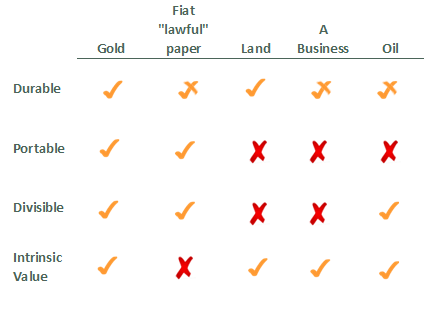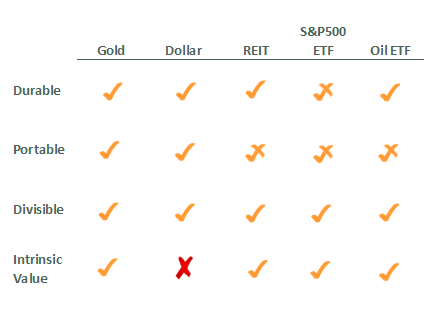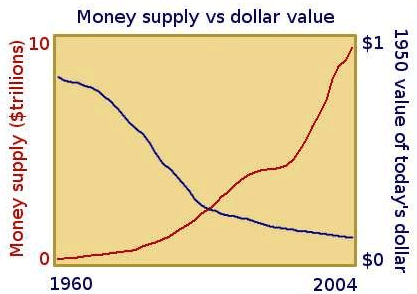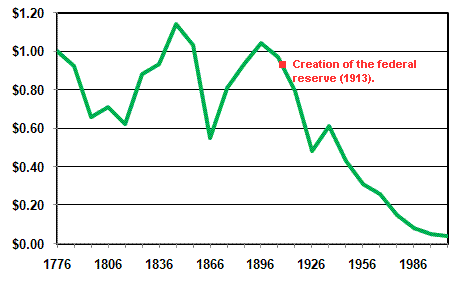Aristotle and the Definition of Money
Commodities / Fiat Currency Apr 30, 2009 - 12:36 PM GMTBy: John_Lee
 There are countless tips on how to make money. This article is not about that. Rather, we examine the definition of money, what makes good money, and how some bad monies stay bad while others have become acceptable through new ideas and technology. In the end we will talk about how money and currency will evolve in the future.
There are countless tips on how to make money. This article is not about that. Rather, we examine the definition of money, what makes good money, and how some bad monies stay bad while others have become acceptable through new ideas and technology. In the end we will talk about how money and currency will evolve in the future.
Definition of Money
Money is anything that is generally accepted as payment for goods and services and repayment of debts. The main uses of money are as a medium of exchange, a unit of account, and a store of value.
Aristotle on good money
Aristotle (384 BC - 322 BC) was a Greek philosopher, a student of Plato and teacher of Alexander the Great. Aristotle discovered, formulated, and analyzed the problem of commensurability. He wondered how ratios for a fair exchange of heterogeneous things could be set. He searched for a principle that makes it possible to equate what is apparently unequal and non-comparable.
Aristotle says that money, as a common measure of everything, makes things commensurable and makes it possible to equalize them. He states that it is in the form of money, a substance that has a telos (purpose), that individuals have devised a unit that supplies a measure on the basis of which just exchange can take place. Aristotle thus maintains that everything can be expressed in the universal equivalent of money. He explains that money was introduced to satisfy the requirement that all items exchanged must be comparable in some way.
Within such frame work, Aristotle defined the characteristics of a good form of money:
1.) It must be durable. Money must stand the test of time and the elements. It must not fade, corrode, or change through time.
2.) It must be portable. Money hold a high amount of 'worth' relative to its weight and size.
3.) It must be divisible. Money should be relatively easy to separate and re-combine without affecting its fundamental characteristics. An extension of this idea is that the item should be 'fungible'. Dictionary.com describes fungible as:
"(esp. of goods) being of such nature or kind as to be freely exchangeable or replaceable, in whole or in part, for another of like nature or kind."
4.) It must have intrinsic value. This value of money should be independent of any other object and contained in the money itself.
Money, 1,000 years ago
Only humans satisfactorily solved commensurability with the idea and practice of money. Throughout history, we have seen the adaptation of various forms of money. Here are some examples with relative merits denoted.

One couldn't treat oil as money since it was not exactly durable and portable. Neither could one use a business (such as a restaurant) as money since it is hardly divisible and ever lasting. Gold has been the choice of money for over 5,000 years because it is valuable, durable, divisible and relatively portable.
Trading assets on paper
A thousand years ago, the ownership title of a land parcel or a business is merely a piece paper for decorative purpose and a registry for the tax collector. The oldest existing stock certificate was issued in 1606 for a Dutch company (Vereinigte Oostindische Compaignie) seeking to profit from the spice trade to India and Far East . Though very profitable in its day, when the company was dissolved in 1799, it was some 10 million Dutch guilders in debt.
American Stock exchanges were introduced in the early 18 th century and wasn't prominent until the 19 th century, where we saw globalization expanded massively with computer technology, air travel, transcontinental pipelines, and giant cargo ships. Today over 50% of US households own stocks collectively worth over $10 trillion. It's only in the last 15 years that an average person can access instant world news and buy stocks with few computer clicks thanks to the internet. Hundreds of millions of people around the world own publicly traded stocks collectively worth over $40 trillion. Over 5 trillion dollars worth of US mortgages have been securitized and owned by world citizens. Title certificates to commodities stored around the world are changing hands valued in the hundreds of $billions on various commodity exchanges.
Money, today

Oil, which has always carried intrinsic value but difficult to store and exchange for other goods, all of a sudden becomes a viable medium of exchange and store of value through the advent of Oil ETF. Oil is stored in a warehouse and your digital ownership certificate is tucked safely in your brokerage account, which you can practically instantly exchange for anything else you want, whether it be Microsoft, gold, wheat, air ticket, hotel room, for less than 1% of commission. Granted, we rely on dollars to calculate the exchange ratios but the role of dollars has diminished greatly in the process as we used it only as an exchange reference (and a lousy one at best) and never kept dollars.
Like oil, various assets once thought to be non-divisible, non-portable, and non-durable are gaining popularity and being saved in lieu of traditional money such as gold and dollars. REIT ETF allows you to "store" real estate around the world and sell in any increment you like, S&P spider ETF allows you to own a piece of America's 500 largest companies with auto rebalancing. You can own Japan , Banks, Wheat, Motion Picture, anything you desire with transparency, liquidity, and low transaction cost.
Those assets are becoming more attractive as store of value with enhanced trading volume, portability, durability and divisibility.
Fiat Currency
Money must be a good store of value by definition.
Fiat paper currencies are popular at times since they are convenient and can be created at will to please the public. However fiat money fails the all important "intrinsic value" test, as its value is solely derived from legal tender laws. The compliance of such law rests on the credibility and strength of the issuing authority. As we know government and political factions can rise and fall faster than pop stars in some cases. It's no surprise that no fiat money has ever survived through time, and they can never be viable money regardless of technological breakthroughs or other human advances.
The value of a dollar


To Recap
What Aristotle described as good money 2,000 years ago has not changed, sound money must be a good medium of exchange as well as a store of value. Assets such as oil or land once weren't considered to be good forms of money due to poor physical or liquidity constraints, have received renewed interest thanks to novel ideas and innovative technology. The internet and various pooled products (ETF) on world markets enabled those once immobile and/or illiquid goods to be transacted with ease, speed, transparency and low cost amongst world buyers and sellers.
The role of fiat money is vanishing. This morning, I sold Newmont Mining to book a hotel in Hong Kong without owning dollars for long. I don't own many dollars, or euros or yuans. Fiat money carries a hefty premium for being a good currency but bad store of value. There is no reason to keep any money without intrinsic value.
My view on gold from this evolution is mixed. On the plus side, gold will crowd out inferior fiat currencies at a faster pace. On the minus side, the choices of store of value have expanded vastly, reducing gold's role to being a fair medium of exchange. Consequently I don't see the combination of a $2,000/oz gold price, a crashing stock market and $30/barrel oil. If that happens, I'd be selling gold, storing oil, and paying with oil.
How can I pay with oil? One can already make payments with digital gold via www.goldmoney.com , I wouldn't be surprised if one invents a way to pay merchants with a share of Disney, or a slice of someone else's mortgaged backyard through a digital land token!
John Lee, CFA
johnlee@maucapital.com
John Lee is a portfolio manager at Mau Capital Management. He is a CFA charter holder and has degrees in Economics and Engineering from Rice University. He previously studied under Mr. James Turk, a renowned authority on the gold market, and is specialized in investing in junior gold and resource companies. Mr. Lee's articles are frequently cited at major resource websites and a esteemed speaker at several major resource conferences.
John Lee Archive |
© 2005-2022 http://www.MarketOracle.co.uk - The Market Oracle is a FREE Daily Financial Markets Analysis & Forecasting online publication.



